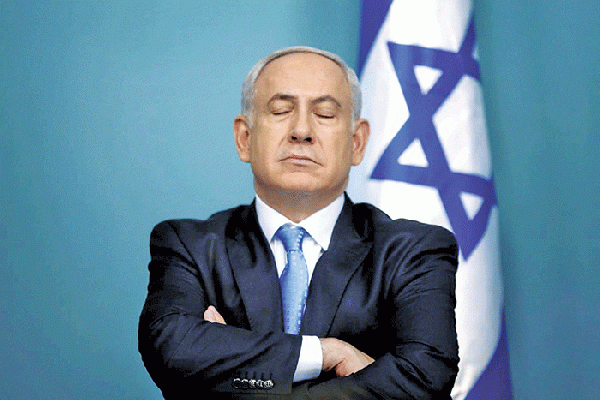
|
| Netanyahu. |
DEARNORN — Benjamin Netanyahu won his fourth term as Israeli prime minister comfortably Tuesday, shocking many political and media observers who were expecting an administration shakeup. His victory follows a slew of backlash about his racist and fear-mongering rallying cry, that some critics say stole him the election.
Poll numbers released the weekend before the election showed the prime minister neck-and-neck or even slightly behind his major political rivals, but Netanyahu went into a last minute offensive.
On the day before the election, Netanyahu declared there would be no independent Palestinian statehood if he remained in power. Then on Election Day he said over social media, “The right-wing government is in danger, Arab voters are coming out in droves to the polls. Left-wing organizations are busing them out.”
Critics worldwide are calling his comments racist and fear-mongering, using prejudice and fear in a desperate attempt to boost his poll numbers in the final stretch. Some feel his public denouncement of a two-state solution has left an open wound in Israeli-Palestinian relations; others feel his comments were business as usual for the administration.
“Netanyahu’s announcement about opposing a Palestinian state is not surprising to Palestinians, as that what he had been doing for the last two decades anyway,” Palestinian American activist Dr. Daad Katato said. “He won the election, which means simply that the Israelis do agree with him in refusing establishment of a Palestinian state and Israelis do not want peace, even with all the concessions that the Palestinian Authority has done since the Oslo Accord.”
University of Michigan-Dearborn political science professor, author and Middle Eastern policy expert Ronald Stockton said Netanyahu’s comments may cause a deeper divide in Israeli-Arab relations.
“We know that Netanyahu is a demagogue, if by that we mean a political leader who plays upon the fears and hatred of some voters for other voters in order to enhance his own position,” Stockton said. “But he always kept a superficial facade as someone who respected Israeli citizens of Arab Christian or Arab Muslim identity.”
Stockton added that Netanyahu no longer wears the mask of acceptance.
“His calls this week for Jews to turn out to stop Arabs shows something more disturbing and ominous than mere demagoguery,” Stockton said.
“Netanyahu had used the fear-mongering to attract more right wing voters by catering to their point of view,” Palestinian activist Mohammad Abd-Elsalam said. “He is the Dick Cheney of Israel, wants to bomb everyone and has no peaceful solution to anything. Everything is solved through the barrels of the gun.”
Netanyahu’s scare tactics have not escaped the radar of the Obama administration. White House press secretary Josh Earnest said the United States is “deeply concerned” about Netanyahu’s rhetoric, which seeks to marginalize Israel’s Arab citizens.
Although no specific or tangible response has been announced regarding the Israeli prime minister’s scare tactics, the U.S. has always been a long-time supporter of a two-state solution.
But not everyone believes the election was won due to the prime minister’s eleventh hour comments.
“Netanyahu’s victory came from pulling voters from his right wing rivals,” Stockton said. “Likewise, the Zionist Union (the old center-left Labor party and its allies) grew stronger by pulling votes from other parties on their side of the spectrum. Labor looked dead a few years ago, but it is back and seems strong.”
Arabs the third party in Israel
Although the election was a big win for Netanyahu, for the first time the Arab parties made huge gains in parliament.
“The election has united the Palestinians in the occupied 1948 areas and the Palestinians became the third major force in the Israeli Parliament.” Abd-Elsalam said.
He added that he hopes they will have enough power to block laws and policies that unfavorably target the Palestinian people.
The newly-formed Joint List party, a coalition made up of three Arab and one Jewish-Arab party, took 14 seats (about 11 percent of the Knesset), giving Arabs a new -found voice inside the Israeli Parliament.
Katato said the Joint List victory was “remarkable” and that the party is made up of “brave men and women” who have always been a nuisance to Netanyahu and the Likud party.
The Israeli Parliament or Knesset is made up of 120 seats. Netanyahu’s Likud party took the top spot with 30 seats, followed by the Zionist Union, which is led by ex-chairman of the Labor party Isaac Herzog and Hatnuah party leader Tzipi Livni, with 24 seats.
The Zionist Union is a center-left political alliance that came together to attempt to take on the politically entrenched Likud party.
“In general, the Likud Party, and its affiliation with the extreme religious and right wing parties, had been more harsh on Palestinians, building more settlements and waging more brutal wars,” Katato said
But she said the Zionist Union is a different side of the same coin, not acting as a symbol for peace but relying on intimidation and irritation tactics towards Palestinians.
Now that the dust has settled, Netanyahu is tasked with forming a new government through coalition building. The state of the post-election Israeli-Palestinian relationship is still unclear, but after months of racially charged comments and mudslinging, tensions are high.
“For the Israeli-Palestinians, the tone has become ominous. Avigdor Lieberman, Netanyahu’s long-time minister of foreign affairs, called for beheading those who cause problems; and Netanyahu called for the Jews to rally against them in the election,” Stockton said. “When leaders start speaking of minority groups in such terms, it is very dangerous for the future.”
Abd-Elsalam said the new administration will be worse than its predecessor by forgoing negations with Palestinians, more settlement activity, and “increasing the Judaization of Jerusalem.”






Leave a Reply